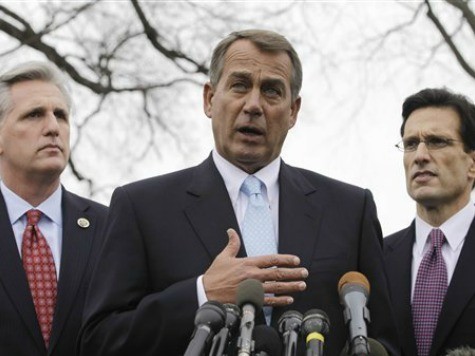The Wall Street Journal editorial page recently highlighted a largely unknown piece of legislation passed by the House of Representatives in May: the Full Faith and Credit Act, sponsored by Rep. Tom McClintock (R-CA). The bill would prevent the federal government from defaulting by mandating that the Treasury pay the nation’s debts even after the debt ceiling is reached. There is enough federal revenue to cover those costs.
That means that some of the government’s discretionary spending would not happen, effectively defunding and shutting down some government functions (perhaps in addition to those that are shut down already). But the U.S. government would not default. The Treasury actually has the discretion to structure payments in this way already, but without legislation mandating that it do so, there is no guarantee that it will.
During the 2011 debt ceiling fight, a few Republicans–some from the Tea Party, and even some moderates–suggested that the Treasury’s public deadlines for a deal were illusory, because it could continue to service the nation’s debt regardless. That is the basis for the spurious charge that the Tea Party, or the GOP itself, wanted default–a baseless claim hurled regularly by President Barack Obama and his Cabinet and party.
This time, the Republican leadership wants to ensure that default is not an option, or even a possibility. That is precisely why Senate Majority Leader Harry Reid (D-NV) has prevented the Senate version of the bill, sponsored by Sen. Pat Toomey (R-PA), from moving forward–and it is also why President Barack Obama has threatened to veto it if it passes. They–not the GOP–want to use threats of default as a bargaining tool.
House Speaker John Boehner, who has managed to hold his caucus together through the shutdown fight, has promised the public that he will not allow the U.S. to default. But that does not mean he will heed the Oct. 17 deadline proclaimed by Secretary of the Treasury Jack Lew. It is becoming clear that the GOP intends to use McClintock-Toomey as its trump card, assigning blame to the Democrats in the event default happens.
That boldness might come as a surprise after Boehner led efforts to reach a compromise last December in the “fiscal cliff” fight. But he was re-elected as Speaker on a promise to take a tougher approach. More than that, President Obama’s refusal to negotiate has strengthened the House leaders’ resolve. They are fighting for more than a delay in Obamacare. They are fighting for the constitutional prerogatives of Congress.
Some of this may play into President Obama’s own strategy–if his strategy is indeed as adventurous as some conservatives claim. According to one theory, what some on Capitol Hill are calling the “Alinsky” idea, the president will try to claim the power to ignore the debt ceiling and merely spend more money, even illegally. Radio host Mark Levin has suggested that the president is laying the groundwork for doing just that.
If he does so, however, House Republicans might not be dismayed. He would be daring them to impeach him, and many will be ready to take him up on the offer. The Senate, controlled by Democrats, would be unlikely to convict him. But the Republicans would be able to make a clear case for control of the Senate in 2014. They seem confident about their chances. Either way, this fight may be about to get much bigger.


COMMENTS
Please let us know if you're having issues with commenting.